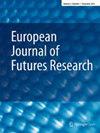Futures literacy in collaborative foresight networks: advancing sustainable shipbuilding
IF 3.7
3区 社会学
Q1 SOCIAL SCIENCES, INTERDISCIPLINARY
引用次数: 0
Abstract
Abstract Businesses are facing increasing pressure from society and regulators to become more sustainable and do their part to address the climate crisis. These businesses will require continual sustainability innovation formulation and implementation processes to meet these demands. Collaborative foresight (CF) has high potential for helping business sectors produce a continuous stream of sustainability options to select and deploy in finished products. Recent developments in futures studies indicate that a capability called futures literacy (FL)—acts of individuals or groups switching their modes and purposes for imagining futures—is relevant to the production of innovation-related outcomes. FL may be key to driving the effectiveness of such foresight collaborations; however, little is known about its exact functions in such business networks and processes. This article examines this issue in the context of a luxury-cruise shipbuilding network in Finland. It analyzes research data from the foresight workstreams of a multi-partner consortium active across three sequential projects between 2016 and 2022. The foresight team took an interventionist research approach, conducting interviews and workshops as part of all three projects. In this article, we analyze the materials produced from these interventions for the appearances of FL enhancement. Based on this analysis, we found that FL can play key functions in CF, such as supporting actors in perceiving new developmental pathways, identifying new opportunities for innovation, and identifying alternative priorities built from new realizations and insights—a finding in line with existing claims by FL scholars and educators. This article contributes to ongoing discussions about the significance of CF and FL in addressing the most pressing environmental issues of our time. It offers an evidence-based argument for the relevance of taking a capabilities approach (i.e., introducing and developing FL) for business networks seeking to use foresight when engaging in sustainability innovation.协同前瞻网络中的未来素养:推进可持续造船
企业正面临来自社会和监管机构越来越大的压力,要求它们变得更加可持续,并为应对气候危机尽自己的一份力量。这些业务将需要持续的可持续性创新,制定和实施流程来满足这些需求。协作预见性(CF)在帮助商业部门产生连续的可持续性选项流以选择和部署成品方面具有很大的潜力。期货研究的最新进展表明,一种被称为期货素养(FL)的能力——个人或群体转换他们想象未来的模式和目的的行为——与创新相关成果的产生有关。FL可能是推动这种前瞻性合作的有效性的关键;然而,人们对其在此类业务网络和流程中的确切功能知之甚少。本文在芬兰的豪华邮轮造船网络的背景下研究了这个问题。它分析了2016年至2022年期间活跃于三个连续项目的多合作伙伴联盟的前瞻性工作流程的研究数据。前瞻团队采取了干预研究方法,在这三个项目中都进行了访谈和研讨会。在本文中,我们分析了这些干预措施产生的材料对FL增强的外观。基于这一分析,我们发现FL可以在CF中发挥关键作用,例如支持参与者感知新的发展途径,识别创新的新机会,以及从新的实现和见解中确定替代优先事项-这一发现与FL学者和教育工作者的现有主张一致。本文对正在进行的关于CF和FL在解决我们这个时代最紧迫的环境问题中的重要性的讨论做出了贡献。它为在从事可持续性创新时寻求使用前瞻性的商业网络采用能力方法(即引入和开发FL)的相关性提供了一个基于证据的论据。
本文章由计算机程序翻译,如有差异,请以英文原文为准。
求助全文
约1分钟内获得全文
求助全文
来源期刊

European Journal of Futures Research
SOCIAL SCIENCES, INTERDISCIPLINARY-
CiteScore
4.60
自引率
9.10%
发文量
23
审稿时长
14 weeks
期刊介绍:
There is a significant need for European futures research as European countries face numerous substantial problems; at the same time they seek to make a contribution to solving global challenges. European regions “share” common experiences, divisions and conflicts – which altogether build a rich resource for critical examination as well as forward-looking renewal. European integration after World War II has reshaped political, economic and social relations in Europe and beyond. Therefore, the future of Europe will also depend on the further development of the European Union in its wider transnational and global contexts. Consequently, the journal seeks to foster thorough analysis of key European policies, such as those for research and education. Nonetheless, topics addressed in the journal are not limited to the (development of the) European Union; we invite articles that raise questions about European futures more generally. Interdisciplinary research is as welcome as are disciplinary studies, ranging from the social sciences and humanities to the natural sciences and engineering.
 求助内容:
求助内容: 应助结果提醒方式:
应助结果提醒方式:


